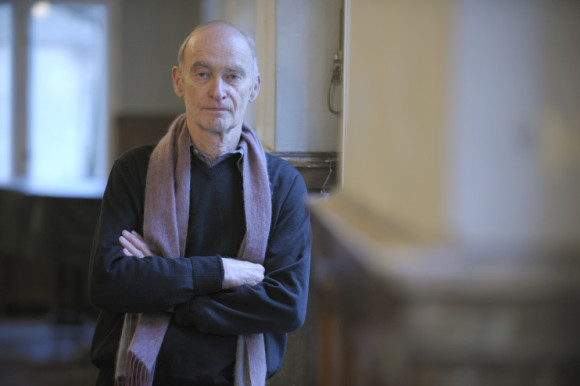Christian Wolff marks 80 years with a pleasurable night of his music
“The New York School Died,” wrote artist Ray Johnson, on an envelope piece of mail art.
Not quite yet. The New York School lives on, outlasting in Christian Wolff, who will turn 80 on Sunday. He celebrated his birthday publicly at Roulette Thursday night, playing his own chamber music in a warm, convivial concert.
The New York School—John Cage, Morton Feldman, Earle Brown and Wolff—was not so much ideological but social. The composers shared some of the same values—Brown and Cage worked together, Wolff studied counterpoint with Cage, but their musical directions differed. Taken together, they cover a vast amount of the territory of post-WWII avant-garde and experimental American classical music.
Wolff, who spent decades teaching classics at Dartmouth, was always the most flexible in terms of music making, working with musicians to see what the results might be, rather than dictating to them via a score what it is they should play. His consistent style has been to create sparsely, but clearly, organized music that gives the players a substantial amount of freedom within specific limits, and he has used a variety of notational methods, from plain note-writing to graphic scores.
At Roulette, he and the musicians played some recent music, including a brand new work, as well as two of his Exercises, an important piece from the early 1970s. Wolff played the piano, and was joined by an excellent group of musicians. Most of them are known by their work in jazz: drummer Joey Baron, horn player Vincent Chancey, bassist Thomas Morgan and trumpeter Nate Wooley. Although for these musicians, the idea of jazz is mostly far from the mainstream tradition.
They were joined by percussionist Robyn Schulkowsky, a first among equals and experienced with this music. Everyone played well, but Schulkowsky had just a bit more natural ease with Wolff’s music, concentrating less on reading what was on the paper in front of her and feeling the pulse of activity more immediately.
Listening and responding to what others are playing within the directions of the composition is a key to Wolff’s music. He gives the musicians and the audience a lot of space to hear what has happened and what might happen next.
The Exercises, numbers 1 and 4, were a model of this and a template for the concert. The music coordinates the musicians through a set of common phrases, then develops variations that sometimes mirror and other times complement each other, as the musicians work together to build the material. The first Exercise paired Baron and Schulkowsky, the second Schulkowsky and Morgan, and the playing was impressive for each. The combination of active listening, attentive but relaxed interaction, and a clear sense that the music was a pleasure to play made for stimulating, witty, and warm music making.
The recent music is fascinating, with a natural, unvarnished loveliness. More of the work is notated in standard musical language, and everything is organized around pithy, almost catchy, tonal phrases.
It’s not that Wolff has become conservative in his later years—more that he seems to have mastered the craft of obtaining his results with the simplest means. The music was both incredibly concentrated and beguilingly transparent, like a clear, but hard and dense marble with a complex and beautiful spiral pattern embedded inside. Turn it slightly, and the view inside changes.
Song (For 6) opened the evening, and like a song the piece is almost homophonic, or at least has enough stretches of lyrical line with a feeling of accompaniment that it could indeed be a song. This 2011 piece, like the other newer works, Percussionist 5, an absorbing percussion duo from 2000, the premiere, Brooklyn (For 6 or more players), have firm beat and tempo that makes the melodic and harmonic invention sound both more free and more organized.
The hardest thing in music like this is to find the right place to stop, where the musicians spontaneously decide they have said enough, and Song (For 6) came to a marvelous, perfect ending that clearly delighted the musicians.
Baron and Schulkowsky had so much fun playing Percussionist 5 that they were laughing out loud at the end. The new work was pure pleasure, starting with an unexpected rumba at the beginning. Coming last on the program, it was completely absorbing, with the sense that the musicians had, in a short stretch of time, become so familiar with Wolff’s idiom that they had nothing to worry about except to make some wonderful music together.

Posted Mar 06, 2015 at 1:17 pm by Gail
Great review of a great concert. I wish I had been there!